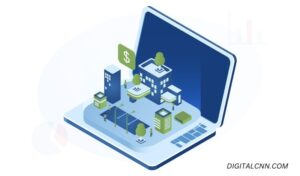Digital real estate has emerged as a compelling investment avenue, offering diverse opportunities for income generation and asset appreciation. As the digital landscape expands, understanding and leveraging digital real estate can lead to significant financial rewards.
Table of Contents
ToggleUnderstanding Digital Real Estate

Digital real estate encompasses virtual properties and assets that exist online, paralleling physical real estate in the digital realm. These assets include websites, domain names, social media accounts, e-commerce stores, and virtual land within the metaverse. Ownership of these digital properties allows individuals and businesses to generate income, much like traditional real estate investments.
Types of Digital Real Estate Investments

Websites and Blogs: Owning a website or blog with substantial traffic can generate revenue through advertising, affiliate marketing, or selling products and services. Building a successful website or blog is one of the easiest ways to invest in digital real estate.
Domain Names: Investing in domain names involves purchasing web addresses with the potential to increase in value. Some domain names sell for millions of dollars, and websites often get acquired for substantial sums.
Virtual Land in the Metaverse: The metaverse offers virtual spaces where users can buy, sell, and develop land. Investing in virtual real estate within platforms like Decentraland or The Sandbox can yield profits as demand for these spaces grows.
E-commerce Stores: Owning an online store allows investors to sell products or services directly to consumers, generating income through digital sales channels.
Social Media Accounts: High-following social media profiles can be monetized through sponsored content, partnerships, and advertising, providing a revenue stream for owners.
Benefits of Investing in Digital Real Estate

Low Entry Barrier: Unlike physical real estate, digital properties often require a smaller initial investment, making them accessible to a broader range of investors.
High ROI Potential: Successful digital properties can yield significant returns, sometimes surpassing traditional real estate investments.
Flexibility and Scalability: Digital assets can be managed from anywhere and scaled efficiently, offering flexibility to investors.
Diversification: Investing in digital real estate allows for portfolio diversification beyond traditional assets, potentially mitigating risk.
Risks and Challenges
While digital real estate presents lucrative opportunities, it also comes with inherent risks:
Market Volatility: The value of digital assets can fluctuate significantly due to market trends and technological advancements.
Technological Challenges: Staying updated with the latest digital trends and technologies is crucial to maintain and grow digital assets.
Security Concerns: Digital properties are susceptible to cyber threats, necessitating robust security measures to protect investments.
How to Get Started in Digital Real Estate
Research and Education: Understand the various types of digital real estate and identify which aligns with your investment goals.
Acquire Digital Assets: Purchase or develop digital properties such as websites, domain names, or virtual land.
Develop and Optimize: Enhance your digital assets to increase their value, focusing on content quality, user experience, and SEO.
Monetize: Implement revenue-generating strategies like advertising, affiliate marketing, or selling products/services.
Stay Informed: Keep abreast of digital market trends and technological developments to adapt and grow your investments.
Conclusion
Digital real estate offers a dynamic and profitable investment landscape for those willing to navigate its complexities. By understanding the various types of digital assets, assessing the benefits and risks, and implementing effective strategies, investors can unlock substantial financial opportunities in the digital realm.
FAQs) about digital real estate
What is digital real estate?
Digital real estate refers to virtual properties, such as domain names, websites, e-commerce stores, social media accounts, and virtual land in the metaverse, that hold monetary value and can be bought, sold, or leased.
How do I start investing in digital real estate?
You can start by identifying valuable digital assets like premium domain names, high-traffic websites, or virtual land in metaverse platforms. Conduct thorough research, acquire the asset, and develop or monetize it for potential profit.
What are the risks of digital real estate investment?
Risks include market volatility, high competition, cybersecurity threats, and regulatory uncertainties. It’s essential to conduct due diligence and diversify investments to minimize potential losses.
Why is digital real estate valuable?
Digital assets generate income through advertising, affiliate marketing, leasing, or sales. Their value is driven by factors such as audience reach, traffic, revenue potential, and market demand.
How is digital real estate different from traditional real estate?
Unlike physical properties, real estate exists entirely online. It offers lower entry costs, faster transactions, and global reach but is also subject to unique challenges like cybersecurity risks and algorithm changes.
What is virtual land in the metaverse?
Virtual land refers to digital parcels within online platforms like Decentraland or The Sandbox. These assets can be developed, leased, or sold, much like physical land, and are increasingly popular as the metaverse grows.
